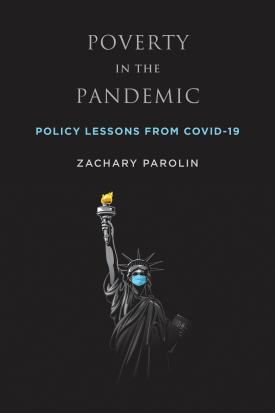
Poverty in the Pandemic
About This Book
"An important and engaging book that is a ‘must read’ for anyone interested in U.S. poverty, whether they be general readers or people working in the poverty field. Perhaps the best new book on U.S. poverty this year."
—ROBERT GREENSTEIN, founder and president emeritus, Center on Budget and Policy Priorities, and visiting fellow, Economic Studies, the Brookings Institution
"Zachary Parolin has given us the most comprehensive and thoughtful summary of how the pandemic affected the poorest amongst us and the policy lessons that emerged from this experience. The sudden onset of COVID underlined how those who were most at risk of poverty were affected, by how much monthly poverty changed and how policy responded, and the lasting consequence of the pandemic for the poorest Americans. Whether the outcome was disparities in job loss, material hardship, income, assets, mental health consequences, or the effects of childcare and school closures on children and their families, it is all masterfully brought together in this compact and highly readable volume."
—TIMOTHY M. SMEEDING, Lee Rainwater Distinguished Professor of Public Affairs and Economics, La Follette School of Public Affairs, University of Wisconsin
"Despite our nation’s enormous wealth, the United States entered the pandemic with high rates of poverty and systematic inequities by race and ethnicity. The public health crisis led to enormous loss of life and economic vitality. The federal government, straddling two administrations, responded in kind with a massive policy response. Zachary Parolin’s comprehensive and readable book studies poverty and inequity in the United States during the COVID-19 pandemic. He assembles a wide range of evidence documenting how poverty acts as a preexisting risk factor for health and economic hardship experienced during this period. He also shows how a robust policy response mitigated the worst of the economic shock and how this can help point the way forward in the next generation of antipoverty policy. A must read for anyone wanting to understand the consequences of poverty and structural inequalities in America."
—HILARY HOYNES, professor of public policy and economics and Haas Distinguished Chair of Economic Disparities, University of California, Berkeley
At the close of 2019, the United States saw a record-low poverty rate. At the start of 2020, the COVID-19 pandemic threatened to upend that trend and plunge millions of Americans into poverty. Contrary to such fears, and despite the highest unemployment rate since the Great Depression, the poverty rate declined to the lowest in modern U.S. history. In Poverty in the Pandemic social policy scholar Zachary Parolin provides a data-rich account of how poverty influenced the economic, social, and health consequences of the COVID-19 pandemic in the U.S., as well as how the country’s policy response led to historically low poverty rates.
Drawing on dozens of data sources—ranging from debit and credit card spending, the first national databases of school and childcare center closures in the U.S., and bi-weekly Census-run surveys on well-being—Parolin finds that those already living in poverty at the start of the pandemic experienced a greater likelihood of contracting and dying from COVID, as well as losing their job. Additionally, he found that students from poor families suffered the greatest learning losses as a result of school closures and the shift to distance learning during the pandemic.
However, unprecedented legislative action by the U.S. government, including the passage of the Families First Coronavirus Response Act (FFCRA), the Coronavirus Aid, Relief, and Economic Security (CARES) Act, and the American Rescue Plan (ARP) helped mitigate the economic consequences of the pandemic and lifted around 18 million Americans out of poverty. Based on the success of these policies, Parolin concludes with policy suggestions that the U.S. can implement in more ‘normal’ times to improve the living conditions of low-income households after the pandemic subsides, including expanding access to Unemployment Insurance, permanently expanding the Child Tax Credit, promoting greater access to affordable, high-quality healthcare coverage, and investing more resources into the Census Bureau’s data-collection capabilities. He also details a method of producing a monthly measurement of poverty, to be used in conjunction with the traditional annual measurement, in order to better understand the intra-year volatility of poverty that many Americans experience.
Poverty in the Pandemic provides the most complete account to date of the unique challenges that low-income households in the U.S. faced during the COVID-19 pandemic and policies that have been proven to help them as we move forward.
ZACHARY PAROLIN is an assistant professor of social policy at Bocconi University and a senior research fellow at Columbia University.
